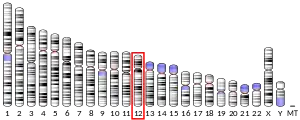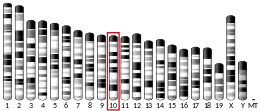| N-acetylglucosamine-6-sulfatase | |||||||||
|---|---|---|---|---|---|---|---|---|---|
| Identifiers | |||||||||
| EC no. | 3.1.6.14 | ||||||||
| CAS no. | 60320-99-2 | ||||||||
| Databases | |||||||||
| IntEnz | IntEnz view | ||||||||
| BRENDA | BRENDA entry | ||||||||
| ExPASy | NiceZyme view | ||||||||
| KEGG | KEGG entry | ||||||||
| MetaCyc | metabolic pathway | ||||||||
| PRIAM | profile | ||||||||
| PDB structures | RCSB PDB PDBe PDBsum | ||||||||
| Gene Ontology | AmiGO / QuickGO | ||||||||
| |||||||||
| GNS | |||||||||||||||||||||||||||||||||||||||||||||||||||
|---|---|---|---|---|---|---|---|---|---|---|---|---|---|---|---|---|---|---|---|---|---|---|---|---|---|---|---|---|---|---|---|---|---|---|---|---|---|---|---|---|---|---|---|---|---|---|---|---|---|---|---|
| Identifiers | |||||||||||||||||||||||||||||||||||||||||||||||||||
| Aliases | GNS, G6S, glucosamine (N-acetyl)-6-sulfatase | ||||||||||||||||||||||||||||||||||||||||||||||||||
| External IDs | OMIM: 607664 MGI: 1922862 HomoloGene: 1568 GeneCards: GNS | ||||||||||||||||||||||||||||||||||||||||||||||||||
| |||||||||||||||||||||||||||||||||||||||||||||||||||
| |||||||||||||||||||||||||||||||||||||||||||||||||||
| |||||||||||||||||||||||||||||||||||||||||||||||||||
| |||||||||||||||||||||||||||||||||||||||||||||||||||
| |||||||||||||||||||||||||||||||||||||||||||||||||||
| Wikidata | |||||||||||||||||||||||||||||||||||||||||||||||||||
| |||||||||||||||||||||||||||||||||||||||||||||||||||
N-acetylglucosamine-6-sulfatase (EC 3.1.6.14, glucosamine (N-acetyl)-6-sulfatase, systematic name N-acetyl-D-glucosamine-6-sulfate 6-sulfohydrolase) is an enzyme that in humans is encoded by the GNS gene.[5] It is deficient in Sanfilippo Syndrome type IIId.[6][7][8] It catalyses the hydrolysis of the 6-sulfate groups of the N-acetyl-D-glucosamine 6-sulfate units of heparan sulfate and keratan sulfate
Function
N-acetylglucosamine-6-sulfatase is a lysosomal enzyme found in all cells. It is involved in the catabolism of heparin, heparan sulphate, and keratan sulphate.[5]
Clinical significance
Deficiency of this enzyme results in the accumulation of undergraded substrate and the lysosomal storage disorder mucopolysaccharidosis type IIID (Sanfilippo D syndrome). Mucopolysaccharidosis type IIID is the least common of the four subtypes of Sanfilippo syndrome.[5]
Nomenclature
The systematic name of this enzyme is "N-acetyl-D-glucosamine-6-sulfate 6-sulfohydrolase". Other accepted names include:
- N-acetylglucosamine-6-sulfatase,
- glucosamine (N-acetyl)-6-sulfatase,
- 2-acetamido-2-deoxy-D-glucose 6-sulfate sulfatase,
- N-acetylglucosamine 6-sulfate sulfatase,
- O,N-disulfate O-sulfohydrolase,
- acetylglucosamine 6-sulfatase,
- chondroitinsulfatase, and
- glucosamine-6-sulfatase.
References
- 1 2 3 GRCh38: Ensembl release 89: ENSG00000135677 - Ensembl, May 2017
- 1 2 3 GRCm38: Ensembl release 89: ENSMUSG00000034707 - Ensembl, May 2017
- ↑ "Human PubMed Reference:". National Center for Biotechnology Information, U.S. National Library of Medicine.
- ↑ "Mouse PubMed Reference:". National Center for Biotechnology Information, U.S. National Library of Medicine.
- 1 2 3 "Entrez Gene: Glucosamine (N-acetyl)-6-sulfatase".
- ↑ Basner R, Kresse H, von Figura K (February 1979). "N-Acetylglucosamine-6-sulfate sulfatase from human urine". J. Biol. Chem. 254 (4): 1151–8. doi:10.1016/S0021-9258(17)34181-9. PMID 762121.
- ↑ Kresse H, Fuchs W, Glössl J, Holtfrerich D, Gilberg W (December 1981). "N-acetylglucosamine-6-sulfate by human β-N-acetylhexosaminidase A". J. Biol. Chem. 256 (24): 12926–32. doi:10.1016/S0021-9258(18)42985-7. PMID 6458607.
- ↑ Weissmann B, Chao H, Chow P (November 1980). "A glucosamine O,N-disulfate O-sulfohydrolase with a probable role in mammalian catabolism of heparan sulfate". Biochem. Biophys. Res. Commun. 97 (2): 827–33. doi:10.1016/0006-291x(80)90338-1. PMID 6451222.
External links
- N-acetylglucosamine-6-sulfatase at the U.S. National Library of Medicine Medical Subject Headings (MeSH)
This article incorporates text from the United States National Library of Medicine, which is in the public domain.



